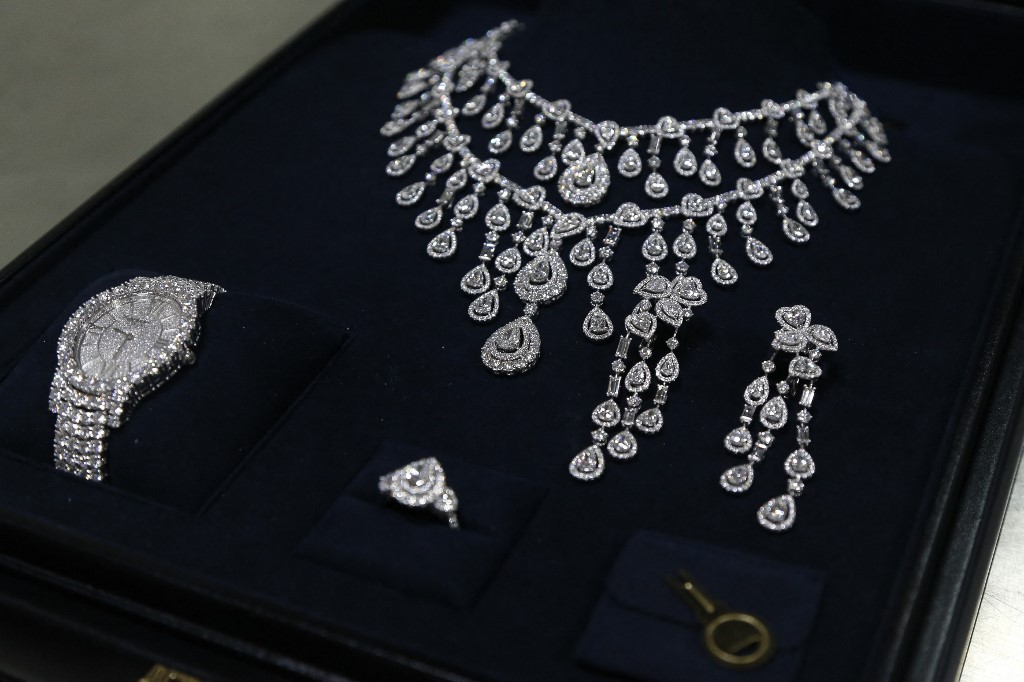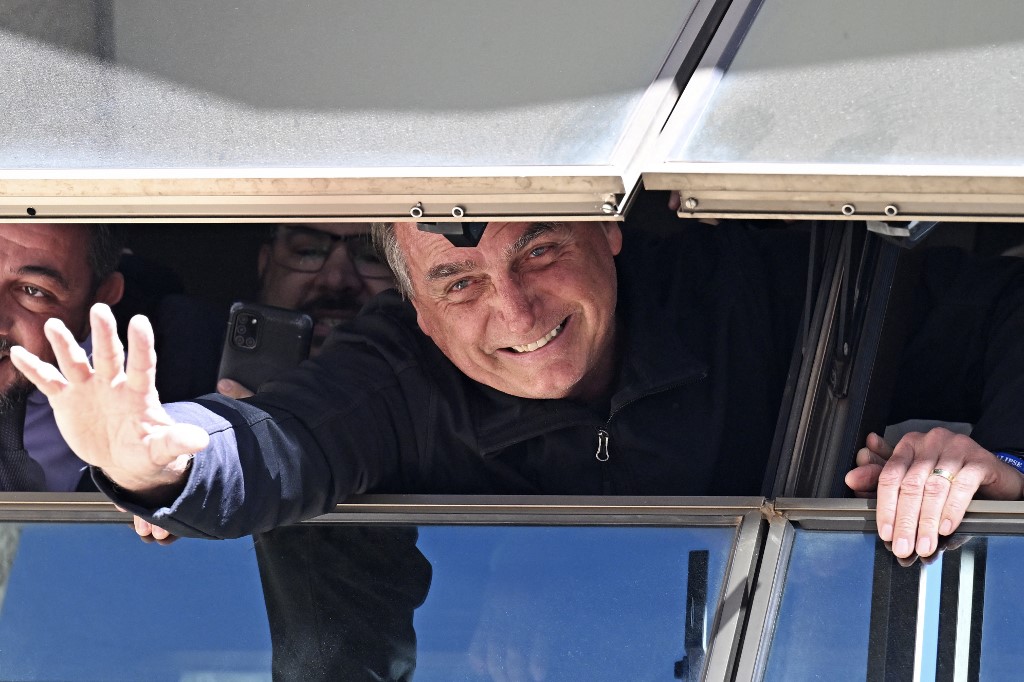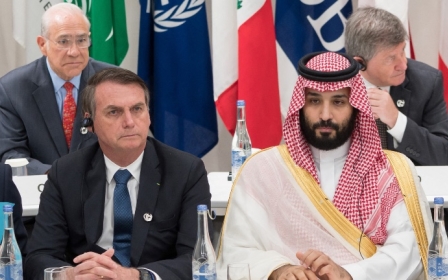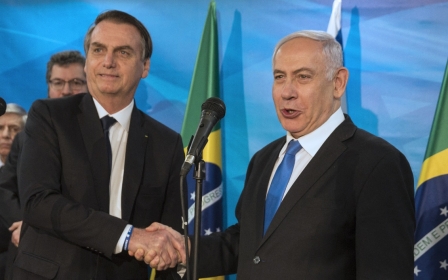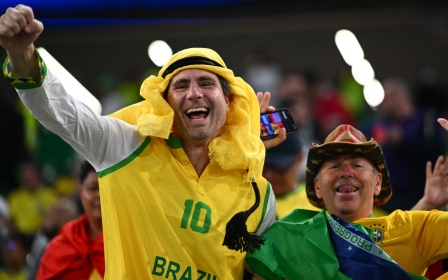Gold Rolex, Chopard cufflinks: How Saudi gifts to Bolsonaro sparked a scandal
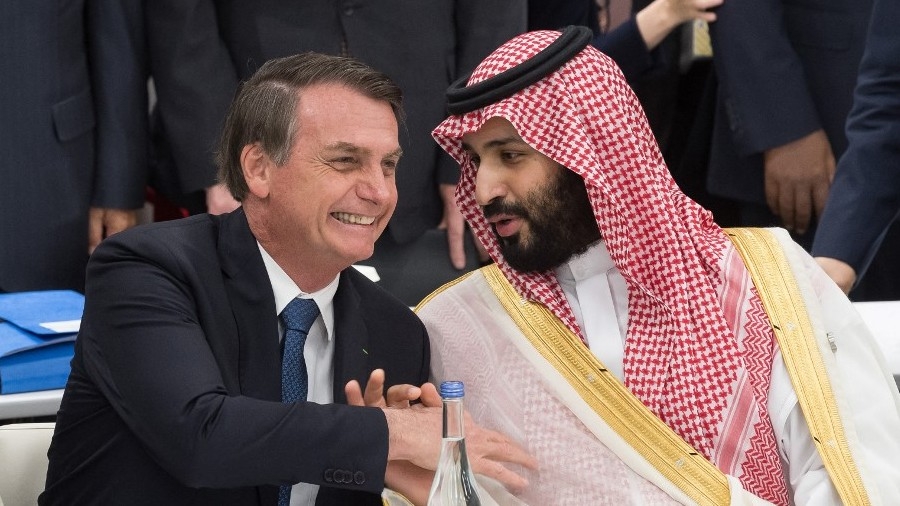
The case involving three sets of jewels given as gifts by the Saudi government to former Brazilian President Jair Bolsonaro between 2019 and 2021 has provoked a scandal in the Latin American country and led to speculations on the Gulf nation’s interests behind the generous offerings.
The 14 items, which had not been reported to Brazil’s revenue service as state gifts, include a white gold Rolex watch studded with diamonds, a pair of luxury Swiss Chopard cufflinks, and Chopard jewellery (given to then first lady Michelle Bolsonaro). The total value of the three sets was estimated at $3.5m.
On 6 March, the federal police launched an inquiry into the Bolsonaro administration’s attempt to smuggle the women's jewellery in October 2021 through Sao Paulo airport.
A group of government officials, then Mines and Energy Minister Bento Albuquerque and his aides, were coming back from an official visit to Saudi Arabia on 26 October and did not report to the customs agents that they were carrying the gifts.
Bolsonaro had not joined them on the visit as he had remained in Brazil, where he had lunch a day earlier with the Saudi ambassador in Brasilia.
New MEE newsletter: Jerusalem Dispatch
Sign up to get the latest insights and analysis on Israel-Palestine, alongside Turkey Unpacked and other MEE newsletters
The officers decided to inspect the luggage of the entourage and discovered that one of Albuquerque’s assistants, Navy Lieutenant Marcos Soeiro, was carrying the jewels in his backpack, hidden inside a golden horse sculpture (whose legs were partially broken).
The women's jewels (with an estimated value of at least $3m) were apprehended by the airport revenue office. News reports revealed that Bolsonaro tried to use his influence to get hold of them on several occasions, pressing members of at least three ministries and even sending an aid in an Air Force jet to Sao Paulo.
Newspapers later revealed that a set of men's jewels was successfully smuggled by the group on that same day. The Federal Court of Accounts, an independent control authority that monitors the federal government finances, ordered Bolsonaro to give the jewellery to the presidency’s general secretariat.
Last week, the Brazilian press discovered that Bolsonaro kept with him a third set of men's jewellery given to him by the Saudi government in 2019. It was not declared to the revenue authority as a state gift.
The 2019 present was kept by Bolsonaro in a farm owned by former Formula One driver Nelson Piquet, a staunch supporter of the far-right politician. (Piquet was convicted of racism on 24 March this year due to the use of racial slurs against F1 champion Lewis Hamilton during an interview. He will have to pay a fine of almost $1m.)
The scandal led many of Bolsonaro’s opponents to question the Saudis' intentions. Senator Omar Aziz, for instance, declared on 14 March that the case had “strong indications of bribery” and related it to the privatisation of Brazilian oil refinery Landulpho Alves, one of the country's oldest and largest, in 2021.
The plant was sold by Brazil's state oil company Petrobras to the United Arab Emirates’ Mubadala Capital for US$1.8bn. According to the oil workers’ union, the refinery’s value was estimated at between $3bn and $4bn by independent institutions.
Aziz demanded clarifications on the deal and declared that he wants to know “who gave those jewels [to Bolsonaro], if it really was Saudi Arabia, and who was the recipient.”
The oil workers’ union released a statement in which it raised similar doubts and demanded an inquiry into the privatisation of the refinery. It affirmed that the “geographical closeness and the strategic alliance” between Saudi Arabia and the UAE justifies its requirement for an investigation.
Gifts part of Saudi culture
With a politically charged atmosphere in Brazil – intensified during last year’s presidential campaign, after which left-wing politician Luiz Inacio Lula da Silva defeated Bolsonaro by a slight margin – the jewellery scandal became politicised.
“Many things were said about the supposed intentions of the Saudi government. Brazil is divided and Bolsonaro’s adversaries created a few theories,” said Tufy Kairuz, an expert in Middle East affairs from York University in Canada.
Kairuz, whose father was a business consultant with deep ties with Saudi Arabia in the 1970s and 1980s, affirmed that the Gulf country has a tradition of giving expensive gifts to foreign dignitaries.
'They have an impulse to be generous and I do not think there is any wrong intention [behind the gifts],'
- Chas Freeman, former US ambassador to Saudi Arabia
“My father once gained a Longines gold watch and a silver misbaha. It is something cultural for them,” he told MEE. His father had exchanged letters with King Faisal bin Abdulaziz for years and encouraged the kingdom to establish an embassy in Brasilia.
Chas Freeman, who was the United States ambassador to Saudi Arabia and former president of the Middle East Policy Council, a think thank in Washington, told MEE that the estimated value of Bolsonaro’s jewels is not extravagant in Saudi terms.
“They have an impulse to be generous and I do not think there is any wrong intention [behind the gifts],” he affirmed.
Stories about Arab – and also Iranian – generosity with foreign authorities abound among diplomats who worked in the region. Retired ambassador Sergio Tutikian, who served for years in Baghdad, Tehran and Kuwait, and led the Middle East department at the Brazilian foreign ministry, told MEE that he commonly gained carpets and other gifts from those countries’ governments.
“I was in charge of accompanying Ashraf Pahlavi, the Iranian shah’s sister, when she came to Brazil in 1978. She would distribute gold coins every day to her Brazilian bodyguards,” he recalled.
When Pahlavi left Brazil, she gave 10 kilograms of fresh beluga caviar to Tutikian.
“At that time, there was no rule restricting the value of the gifts we were allowed to accept. In fact, it would be greatly offensive to refuse an offering like that,” he claimed.
According to Isac Falcao, who heads the national union of tax auditors of the revenue service, the current law in Brazil determines that government officials cannot accept gifts with a value higher than 1 percent of the maximum wage among government authorities. In 2023, it corresponds to US$82.
When it comes to gifts given to the president, the rule establishes that expensive goods must be added to the presidential collection. At the end of his or her tenure, this way, the leader is not allowed to keep them. That was, apparently, what Bolsonaro was trying to avoid.
“The jewels given to Bolsonaro [and his wife] were part of the country’s patrimony. But they were brought to Brazil atypically,” he told MEE.
The minister’s assistant who was carrying the jewellery gifts had to report them to the customs authorities, Falcao said.
“No taxes would be charged if the jewels were declared as a gift to the president, given that the federal government does not tax itself,” he said.
The attempt to get into national territory with a concealed object in order to avoid paying taxes may constitute a criminal act.
After the concealed jewels were discovered and seized, the presidency made several attempts to recover them, but its envoys repeatedly refused to formalise them as state goods, Falcão recalled.
“Later, news reports showed that other jewels were kept by the president. All those aspects are indications of a potential attempt at private appropriation of public goods,” Falcao declared.
'Penal consequences'
According to Falcao, the ongoing police inquiry will demonstrate if that attempt really happened and will probably lead to the incorporation of the jewellery into the public patrimony.
“There might be penal consequences,” he concluded.
Kairuz’s conclusion is that “there is nothing wrong on the Saudi government’s side, only on Bolsonaro’s side.
“Any measure taken in regard to that case is exclusively a Brazilian matter,” he said.
'The Brazilians should have dealt with it more prudently. Maybe we owe Saudi Arabia an apology'
- Sergio Tutikian, retired ambassador
Tutikian considers that the case was politicised in Brazil and became a media scandal, something that could impact Saudi-Brazilian relations.
“This probably generated discomfort among them [Saudi Arabia]. The Brazilians should have dealt with it more prudently. Maybe we owe Saudi Arabia an apology,” he argued.
The 68-year-old Bolsonaro returned to Brazil on Thursday after three months in self-imposed exile in Florida.
The former president faces five Supreme Court investigations that could send him to prison - four for alleged crimes during his term (2019-2022), and one over accusations he incited a riot by supporters who invaded the presidential palace, Congress and the Supreme Court on 8 January, protesting at his election defeat.
Middle East Eye delivers independent and unrivalled coverage and analysis of the Middle East, North Africa and beyond. To learn more about republishing this content and the associated fees, please fill out this form. More about MEE can be found here.


